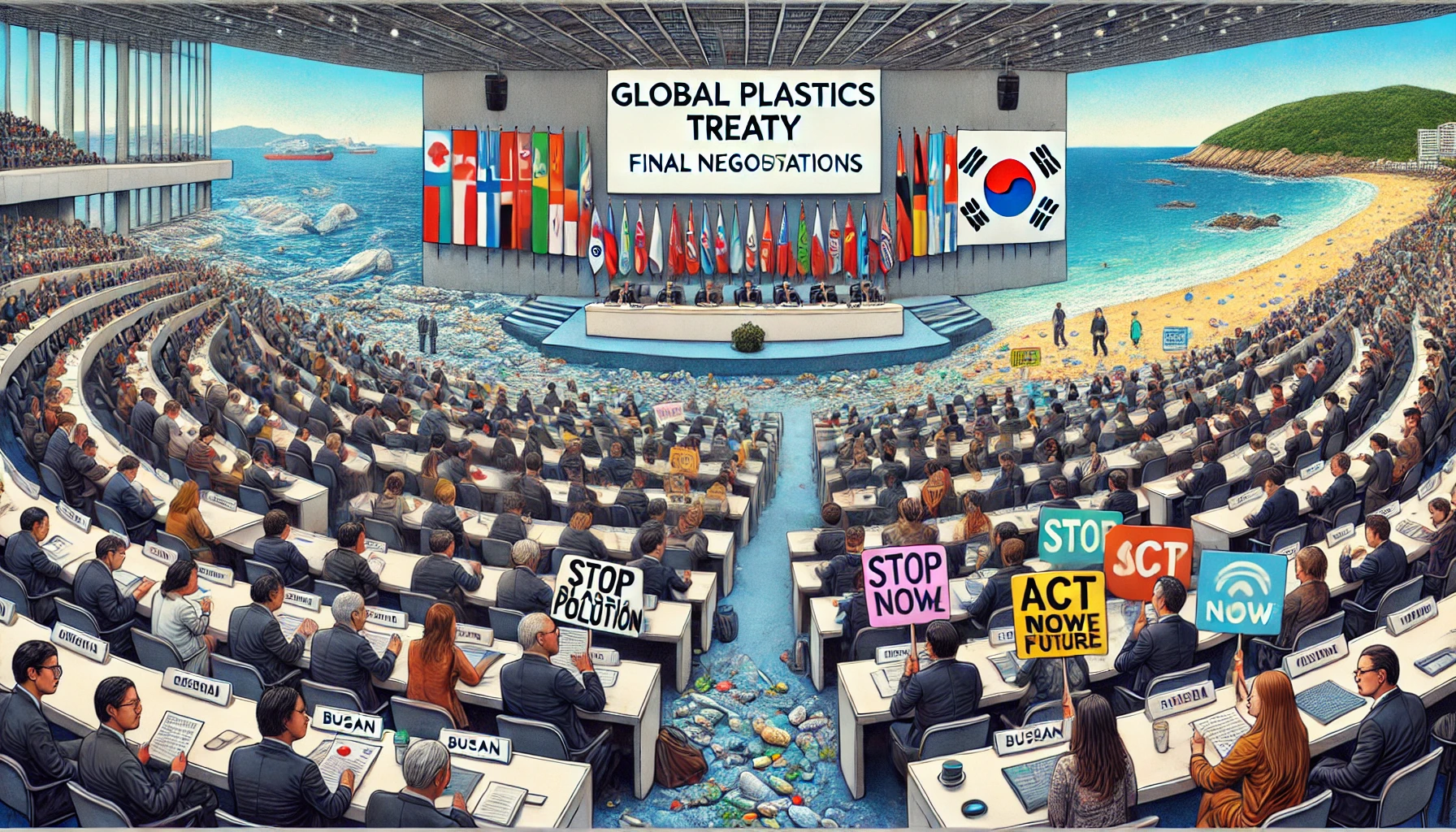Explore the final round of Global Plastics Treaty negotiations in Busan, where nations strive to combat plastic pollution through binding agreements, addressing production, lifecycle, and funding challenges.
As the final round of Global Plastics Treaty negotiations in Busan unfolds from November 25 to December 1, 2024, the world watches closely. This event marks a critical juncture in global efforts to address the escalating plastic pollution crisis. With stakeholders from governments, scientists, civil society, and activists converging in South Korea, the stakes couldn’t be higher.
Key Players and Ambitions
At the forefront is the High Ambition Coalition, a bloc of African, Asian, and European nations advocating for robust, legally binding measures. Their goals include capping plastic production, addressing the entire lifecycle of plastics, and banning toxic chemicals associated with plastic manufacturing and use. Such ambitious targets aim to shift the global paradigm on plastics from production to disposal.
Contentious Debates
The negotiations are not without challenges. Sharp divisions persist over whether the treaty should enforce caps on plastic production or rely on voluntary targets. Another sticking point is the inclusion of financial mechanisms to support implementation, particularly for developing nations, alongside calls for bans on harmful chemicals in plastic products.
Activist Voices and Public Pressure
The importance of public advocacy is evident. Over 1,500 activists took to the streets of Busan, amplifying their call for action. Civil society organizations delivered a petition bearing nearly three million signatures to negotiators, underscoring the demand for a robust treaty. Their voices echo a growing global awareness of the urgent need for transformative change.
Science-Based Support
The scientific community has also made its position clear. More than 900 independent scientists signed a declaration urging an effective treaty to eliminate plastic pollution by 2040. This aligns with growing research showing the profound environmental and economic toll of plastics, from marine ecosystem degradation to GDP losses estimated at $7 billion annually.
Regional Leadership
ASEAN countries are playing a pivotal role in shaping the treaty. For instance, the Philippines has emphasized the importance of Indigenous Peoples’ rights and biodiversity finance, highlighting the intersection of plastic pollution with cultural and ecological preservation.
The Economic Argument
Plastic pollution isn’t just an environmental crisis; it’s an economic one. The staggering costs tied to marine pollution, reduced fisheries yields, and tourism losses underscore the need for immediate action. Investing in sustainable alternatives and stricter regulations can avert further economic and ecological damage.
What’s at Stake?
The final round of Global Plastics Treaty negotiations in Busan holds significant global importance. It represents a once-in-a-generation opportunity to tackle one of the most pressing environmental crises of our time—plastic pollution. The outcome of these negotiations will have far-reaching implications for the future of the planet, its ecosystems, and human societies.
If the negotiations fail to produce strong, legally binding measures, the world risks perpetuating the current trajectory of plastic pollution, which already threatens wildlife, oceans, and human health. The lack of meaningful agreements could delay critical actions to curb plastic production and consumption, allowing plastic waste to continue accumulating in landfills, rivers, and oceans. This not only harms marine life and biodiversity but also disrupts entire ecosystems that rely on a healthy environment to thrive. The ongoing pollution of waterways and coastlines will likely exacerbate the climate crisis, as plastic waste contributes to carbon emissions and interferes with efforts to restore natural habitats.
From an economic perspective, continued plastic pollution imposes heavy financial burdens on governments, industries, and communities. The costs associated with cleaning up plastic waste, maintaining marine ecosystems, and mitigating the health impacts of plastic ingestion are already in the billions annually. The damage to fisheries, tourism, and agriculture could lead to more widespread poverty and inequality, especially in developing nations that rely heavily on natural resources. Failure to act now could further strain these economies, delaying the transition to sustainable, circular economies and hindering innovation in waste management and sustainable production.
Conversely, if the negotiators can secure a robust, legally binding treaty, the potential for transformative change is immense. A strong global agreement could set the foundation for a world where plastic production and consumption are responsibly managed, reducing the harmful impacts of plastic pollution on the environment, economies, and societies. By establishing concrete targets for plastic production caps, recycling, and waste management, a successful treaty could reduce the global plastic footprint and create sustainable alternatives that will benefit both nature and industry.
Moreover, success in Busan could inspire a collective, unified global effort to phase out harmful plastics and move toward a circular economy where materials are reused and recycled, minimizing waste. Such a treaty would also reinforce the importance of international collaboration and solidarity, especially among developing countries that are disproportionately impacted by plastic pollution but often lack the resources to address it. By creating financial mechanisms for these nations, the treaty would promote equitable solutions, ensuring that all countries, regardless of economic status, can contribute to and benefit from a plastic-free future.
In sum, the stakes are incredibly high. The outcome of the Global Plastics Treaty negotiations will either secure a future where plastic pollution is reduced, ecosystems are protected, and economies thrive, or it will prolong the devastation caused by plastics, with irreversible consequences for future generations. The world’s leaders and negotiators have the opportunity to make a historic decision that could define the trajectory of global environmental policy for decades to come.
